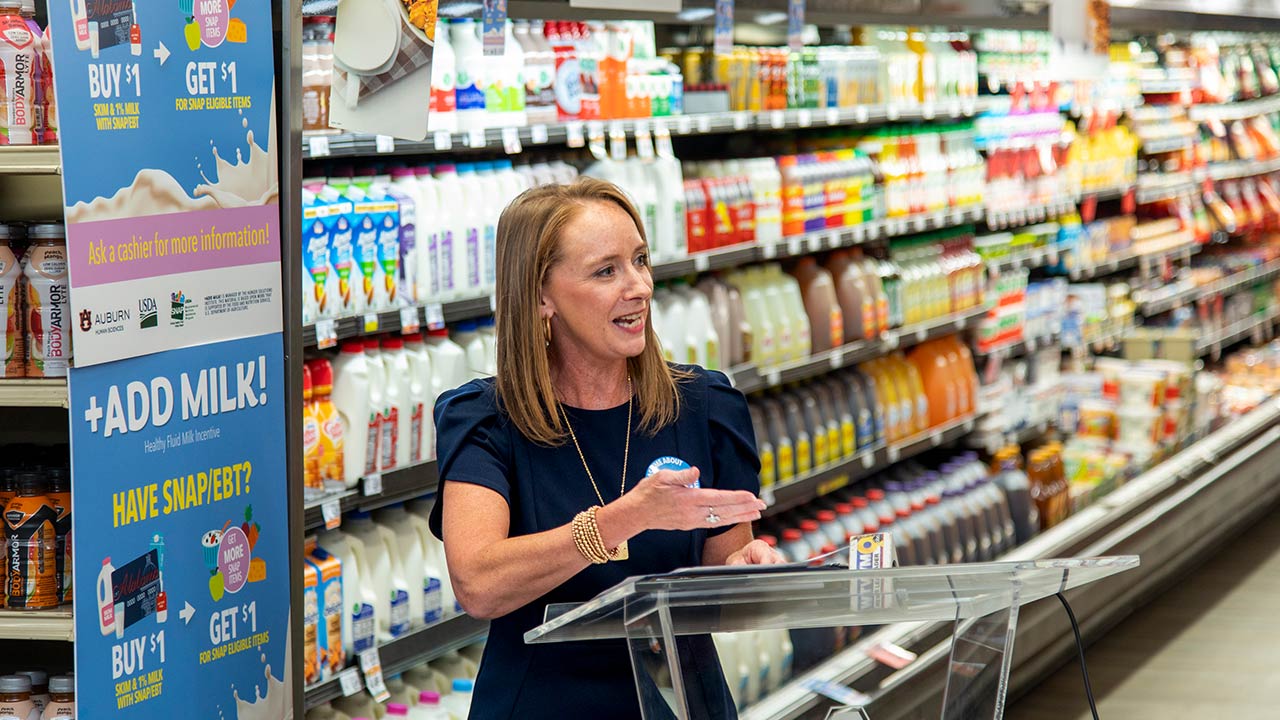content body
Alicia Powers, managing director for the Hunger Solutions Institute (HSI) in Auburn’s College of Human Sciences, is on a mission to strategically build healthy, resilient communities. Her research and service efforts with HSI — including nutrition incentive programs for SNAP households in Alabama and beyond — have made many take notice and take action.
Under Powers’ leadership, HSI has to-date received nearly $10 million in funding toward research and programs that directly address hunger in food insecure communities.

Alicia Powers, managing director of the Hunger Solutions Institute, helped launch the +Add Milk pilot program in 2022.
HSI tackles hunger through research, teaching and service
The Hunger Solutions Institute was founded in 2012 with a simple core belief that drives all their endeavors: hunger is a solvable problem. Since then, the College of Human Sciences has sought multi-sector partnerships at the community, state, national and global levels to address food security domestically and globally.
Powers first came to HSI in 2018 as the director of strategy and policy under the late, former Dean June Henton and Managing Director Harriet Giles. A year later, upon Henton and Giles’ retirement, Powers transitioned to her current role as managing director.
“My goal was to more fully develop the research area within HSI to build out HSI as a comprehensive academic center integrating teaching, research and service,” Powers said. “My highest priority was to write grants to secure research and programmatic dollars. A goal of every grant received is to commit half of the grant dollars to communities with underserved populations to continue to bolster HSI’s service activities. Then, graduate and undergraduate students become involved with the research and programming, so we are folding in the teaching component.”
Powers and the HSI team have strategically identified four priority areas: hunger and food access; hunger and higher education; hunger and health; and hunger and rural communities.

Nutrition incentive programs like +Add Milk and Double Up Food Bucks Alabama help SNAP participants purchase more fresh fruit and vegetables.
Alabama nutrition incentive program receives a boost
One of HSI’s most successful projects is Double Up Food Bucks Alabama. Funded by a $1 million grant from the Gus Schumacher Nutrition Incentive Program within the U.S. Department of Agriculture’s National Institute of Food and Agriculture and matching funders, Double Up Food Bucks helps Alabama residents have access to healthy, fresh produce. Launched in September 2021, Double Up Food Bucks Alabama makes fresh, healthy produce more accessible to all, allowing Alabama residents who use Supplemental Nutrition Assistance Program (SNAP) benefits to purchase double the amount of fresh fruits and vegetables from local farmers at farmers markets and independent grocers.
“When SNAP participants utilize their EBT card at participating locations to purchase fresh fruits and vegetables, they get a dollar-for-dollar match to purchase more fresh fruits and vegetables,” Powers said. “HSI received the grant to fund the program and partnered with retailers to support the nutrition incentive.”
More than 15% of the Alabama population, or 725,000 residents, participate in SNAP. Double Up Food Bucks Alabama is in its third year and currently serves six counties. Power’s goal is to obtain additional federal, state and private funding, so the program can expand to more areas of the state.
"We are proud of Alicia Powers’ leadership through the Hunger Solutions Institute, and to know this effort to put healthy options on the tables of low-income families is growing from four states to 16 in less than a year is phenomenal.”
Add Milk! takes dairy incentives nationwide
This fall, the USDA Food and Nutrition Service awarded HSI a nearly $4 million grant for the 2023 Healthy Fluid Milk Incentives program (HFMI 2023), the second award to HSI since 2022. Combined, HSI has received $7 million to continue developing and testing methods to increase the purchase and consumption of nonfat and low-fat milk among low-income consumers participating in SNAP. HFMI 2023 will significantly expand the current Add Milk! pilot project.
HSI launched Add Milk! in 2022 with a nearly $3 million grant from the USDA. Add Milk! seeks to increase the purchase of nonfat and low-fat milk by SNAP participants. Similar to Double Up Food Bucks, for every dollar of SNAP benefits a participant uses to purchase healthy fluid milk at a participating location, Add Milk! provides a dollar for dollar incentive as a coupon to redeem for additional SNAP items. In 2022, the program operated in four states at 116 locations.
“Nutrition incentive programs make healthier foods more accessible to individuals who may be living on a limited budget. Milk provides 13 nutrients in one glass, and nutritionally dense foods can help individuals live a healthier lifestyle,” Powers said.
With the new funding, Add Milk! will add 575 participating locations operated by 16 partnering retailers in 16 states and shift the model to an automatic 50% discount for qualifying milk purchases of nonfat or low-fat milk.
In addition to Powers, HFMI researchers include Kara Newby, project administrator for HSI, and Joel Cuffey, an agriculture economist in Auburn’s College of Agriculture. They are investigating the use and effectiveness of Add Milk! along with determining how the nutrition incentive influences use of SNAP dollars. Analyses to-date revealed SNAP households are utilizing the incentive to stretch their SNAP dollars throughout the month and support the purchase of healthier foods.
“Cuffey’s research is helping us understand how the program is working, how it is supporting SNAP households and what we can do to improve it,” Powers said.
“Milk, fruits and vegetables are all essential components of a healthy diet, and they tend to be a bit more expensive than foods that are not as nutritionally dense,” she added. “The benefits of these nutrition incentive programs is to make healthier foods more accessible to individuals who may be living on a limited budget. From a public health nutrition perspective, nutrition incentives are incredible programs.”
The new grant will also allow HSI to expand its research scope to better understand SNAP-authorized retailers — including independent retail grocers, supercenters that combine groceries and a department store and convenience stores — to further inform scaling the program.
“Research is at the core of all we do at Auburn University, with the end goal being to find ways to enhance quality of life for individuals, families and communities,” said Susan Hubbard, dean of the College of Human Sciences at Auburn. “We are proud of Alicia Powers’ leadership through the Hunger Solutions Institute, and to know this effort to put healthy options on the tables of low-income families is growing from four states to 16 in less than a year is phenomenal.”
Student and university engagement
HSI hosts workshops that bring together nationwide researchers focusing on nutrition incentives. Powers also facilitates collaboration through two, international networks: Universities Fighting World Hunger (UFWH) and Presidents United to Solve Hunger (PUSH).
“UFWH is focused on amplifying the voice of the rising generation of college students,” Powers said. “HSI supports student chapters on college campuses in the United States and abroad. HSI offers monthly activities to encourage UFWH chapters to raise awareness and advocate for hunger issues and solutions.”
HSI hosts an annual summit alongside a university that has a UFWH chapter. The grassroots effort engages college students to raise awareness, take action and advocate for food and nutrition security efforts locally, nationally and internationally.
PUSH works with college presidents and chancellors who sign a commitment that hunger will be a foundational priority of their university through teaching, research or service.
“We have 115 signatories for presidents and chancellors, and we host a leaders forum each year for those presidents and chancellors in conjunction with our UFWH summit,” Powers said. “To solve hunger, our collaborators want to remain engaged, informed and active.”
“Hunger is solvable, but it's only going to be solved when all disciplines and all sectors come together and move forward collectively. When we help an educator, an engineer, a physician view their work through a hunger lens, that's how we're going to begin to move the needle.”
What’s next
Beyond the significant grant money, Powers also is the 2023 recipient of the Ellen Swallow Richards Public Service Award — one of the highest honors bestowed by the Association of Public and Land-grant Universities (APLU) Board on Health and Human Sciences. The award recognizes her national leadership in addressing and advancing human sciences in nutrition.
Powers hopes the attention shines a light on the research, teaching and service efforts of HSI.
“I am humbled to receive the 2023 Ellen Swallow Richards Public Service Award. I pursued a PhD in nutrition and made decisions for each step of my professional journey with one particular purpose in mind — to use my time and talents to serve populations living in under-resourced communities,” Powers said.
“Hunger is solvable, but it's only going to be solved when all disciplines and all sectors come together and move forward collectively. When we help an educator, an engineer, a physician view their work through a hunger lens, that's how we're going to begin to move the needle.”
A few other efforts that were not highlighted but are part of HSI prioritized and integrated work is Hunger Free Higher Ed and End Child Hunger in Alabama.




